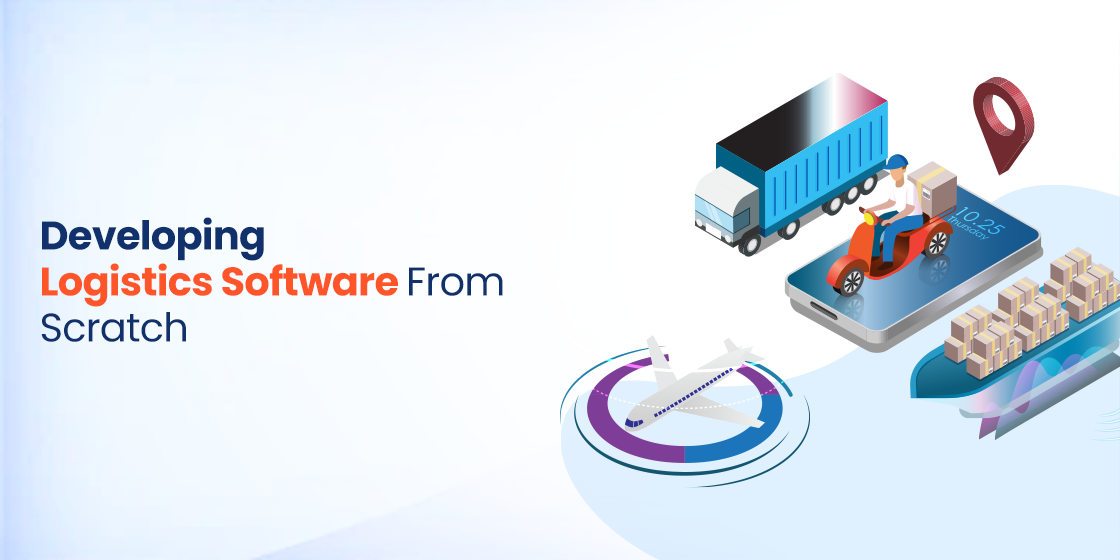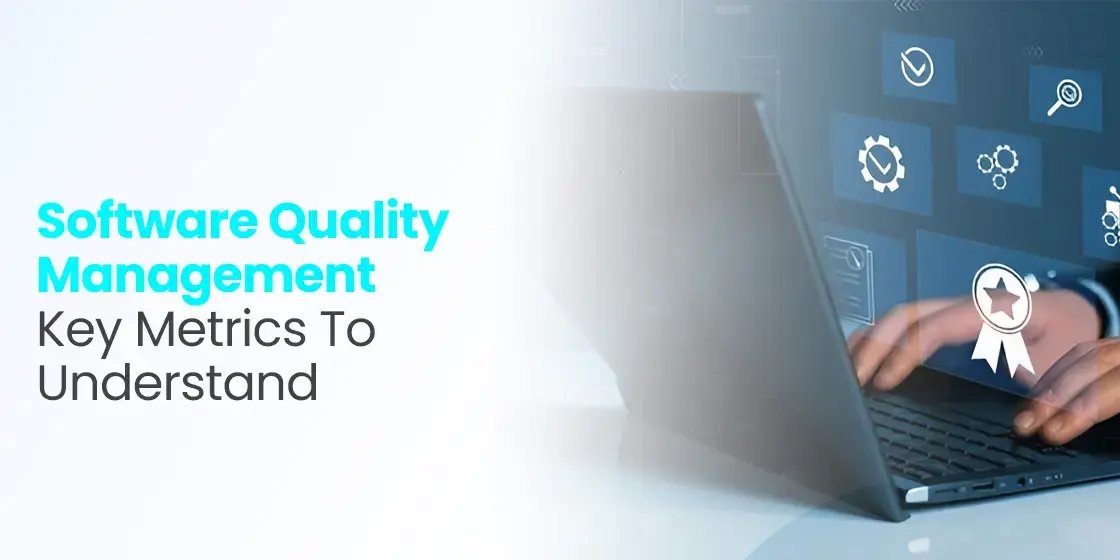Table of Content
Know About the Basics of Logistics Software Development in Detail Below
The evolution of technology has allowed businesses to transform themselves in a new manner. The emergence of advanced software products has helped many companies to take a lead in the digital world. Speaking about logistics companies, they are also taking the advantage of custom software development services to elevate their operations in the industry. The development in their domain is called logistics software development which basically implies to build advanced systems for hassle free logistics operations.
Building a logistics application is certainly not an easy task. However, if you’ve got the required knowledge and skills to build a powerful app, you can nail down this process pretty easily. That is where many beginners struggle because they simply do not know how to start logistics software development from scratch. They don’t understand the basics of this development, which is indeed very important for this process.
By understanding the principles of logistics software development, you can easily work on any project that is related to a shipping or inventory management company. Fortunately, this blog will help you to understand all the concepts properly. It will let you know how to start logistics software development by following the rights methodologies of product development.
Let us first start from the basics understanding what is logistics software development and why it is gaining traction in the market.
What is Logistics Software Development?

Logistics software development refers to the product development process for a supply chain and logistics company. It ensures to develop an advanced product that can fulfill all the functional requirements of a supply chain company. Built with advanced technologies, logistics product comes up with a variety of features such as inventory tracking, forecasting tools, warehouse management and more others.
With the help of a logistics software, it becomes easy for administrators to keep a track of different things. They do not have to hold registers or books to note down the details of different products. Instead, the interactive features of a logistics app provide flexibility to the users to manage everything on fingertips. It not only eases the work, but also saves a lot of time of the administrators. That is how they can streamline different tasks without indulging in anything manually.
Rising Popularity of Logistics Software Development
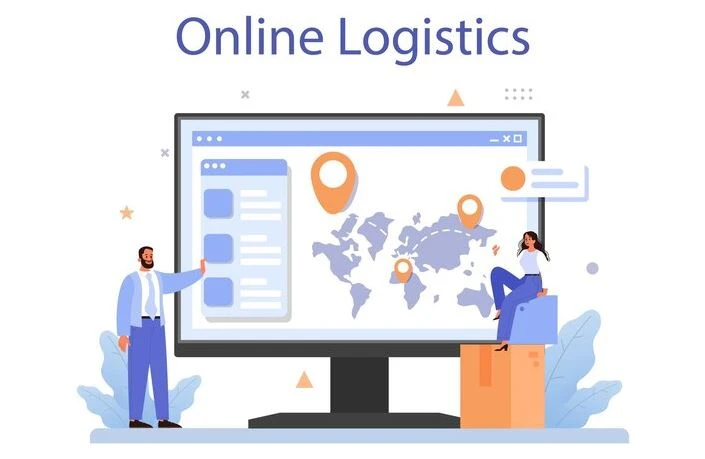
The rising popularity of logistics software development can be attributed to several key factors that have transformed the way businesses manage their supply chains. First and foremost, the increasing complexity and scale of global logistics operations have necessitated the adoption of advanced technologies to streamline processes and enhance efficiency. Logistics software provides businesses with the tools to automate and optimize various aspects of supply chain, from inventory management and order fulfillment to route optimization and transportation management.
Another driving force behind the surge in logistics software development is the growing demand for real-time data and analytics. Businesses are increasingly recognizing the importance of data-driven decision-making in optimizing their supply chain operations. Logistics software solutions offer robust analytics capabilities that enable organizations to gain insights into their logistics processes, identify bottlenecks, and make informed decisions to improve overall performance.
Furthermore, the rise of e-commerce and the shift towards omnichannel retailing have accelerated the adoption of logistics software. As consumers expect faster and more reliable delivery services, logistics software plays a crucial role in helping businesses meet these expectations. By automating order processing, optimizing delivery routes, and providing real-time visibility into the entire supply chain, logistics software enables companies to offer timely and accurate deliveries, contributing to customer loyalty and satisfaction.
How to Develop Logistics Software: Important Points to Remember
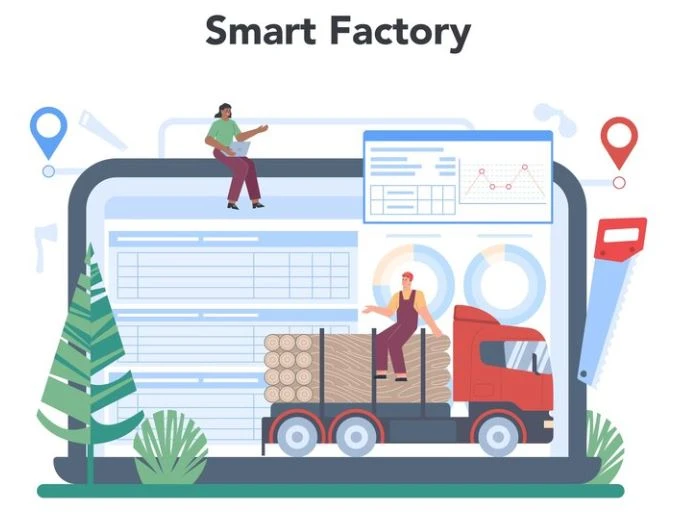
Logistics software development is not an easy process, however, it can be done efficiently by following the right strategy. This includes clear understanding of some points that could help developers in performing the overall process. Let’s take a look at them in detail below.
Conduct Research
Conducting research for a logistics software involves a systematic and comprehensive approach to gather the necessary information and insights required for successful system design and implementation. Initially, it is crucial to assess the current state of logistics and supply chain management, identifying existing challenges and gaps in efficiency.
In parallel, a thorough examination of existing logistics software solutions is essential. This includes analyzing the features, functionalities, and user experiences of current software offerings. By conducting a competitive analysis, developers can identify strengths and weaknesses in existing solutions, helping them define unique value propositions for their software.
Pick Development Methodology
Selecting a development strategy for logistics software involves careful consideration of various factors to ensure the successful creation of a robust and effective solution. The first step is to define the specific goals and requirements of the logistics software. Understanding the unique needs of the supply chain, including inventory management, order processing, and transportation logistics, is essential.
Another crucial aspect is selecting the right technology stack and architecture for logistics software development. This involves deciding on programming languages, databases, frameworks, and infrastructure. The choice of technology should align with the project’s goals, team expertise, and the scalability requirements of the logistics solution.
Select Development Stack
The selection of software development tools for a logistics product is a critical aspect that significantly influences the efficiency, scalability, and overall success of the project. For logistics software, languages like Python, Java, or C# are commonly used, and frameworks such as Django or Spring can provide a structured and efficient development environment.
Embracing cloud computing is another strategic decision in logistics software development. Cloud platforms like AWS, Azure, or Google Cloud offer scalability, flexibility, and cost-effectiveness, enabling developers to build and deploy logistics solutions with ease. The utilization of containerization technologies like Docker and orchestration tools like Kubernetes can enhance deployment and management efficiency.
Start Project Development
Once you have collected all the data and selected tools for logistics software development, move ahead in the development stage. In this phase, you have to work smartly following all the plans that have been documented at the start. This will certainly be a long process, so make sure to give it ample amount of time without making any hurry in coding.
It is best recommended to work with a team of experts to develop a quality logistics software. It not only reduces your workload, but also save a lot of time. This strategy simplifies development, allowing more brains to work cohesively on a project with a single goal.
Test and Debug Application
The subsequent phase in the software development process is of paramount importance, focusing on meticulous scrutiny to guarantee the flawless functioning of the software and the identification and resolution of any faults or issues. This critical stage involves a comprehensive testing regimen where developers employ various techniques to assess different aspects of the software’s performance.
Throughout the testing process, developers not only strive to identify and rectify flaws but also work to ensure that the software aligns with the specified criteria and functions optimally. This involves scrutinizing the software’s response to diverse inputs, assessing its resilience to potential errors, and verifying that it meets performance benchmarks.
Key Features of a Logistics Software
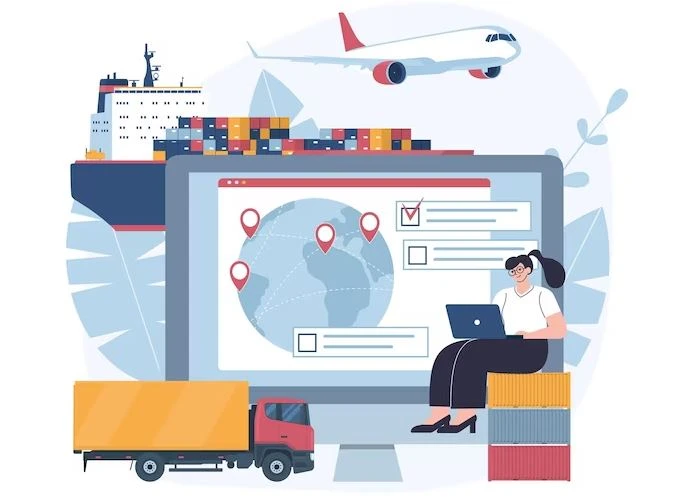
A logistics software should be built with a variety of features. It should facilitate users to perform different types of tasks, so that manual workload can be reduced. Here are some of the key features that should be present in a logistics software product.
Live Supply Chain Visibility
Logistics software offers a comprehensive and current overview of your supply chain operations, furnishing you with precise and timely information. The integration of real-time visibility into the software empowers businesses to closely monitor various facets of their supply chain. This includes the ability to track the progress of shipments in real-time, closely monitor inventory levels, and promptly identify any bottlenecks or delays within the supply chain.
With this enhanced visibility, logistics software not only enables the seamless tracking of shipments but also facilitates a deeper understanding of inventory dynamics. Monitoring inventory levels in real-time becomes a dynamic process, allowing businesses to make informed decisions about restocking, order fulfillment, and inventory management.
Inventory Management
Logistics software provides a robust platform for the efficient management and meticulous tracking of various aspects of your business operations, including inventory levels, warehouse activities, and logistics processes. Leveraging specialized inventory management software within this framework facilitates a comprehensive approach to inventory control. This entails the seamless monitoring of stock levels, enabling businesses to track the movement of shipments efficiently.
The intricacies of effective inventory management extend beyond mere stock tracking, encompassing the need for strategic planning and resource optimization. Utilizing inventory management software within the logistics framework empowers businesses to implement proactive measures. For instance, barcode and QR systems play a pivotal role in enhancing accuracy and efficiency by providing a reliable means of tagging and categorizing inventory items.
Order Management
This functionality provides a comprehensive solution for the efficient handling and meticulous tracking of orders across the entire lifecycle. Within this feature, users have the capability to seamlessly create, manage, and update orders, offering a centralized hub for overseeing the entire order management process. This includes the ability to closely monitor the status of orders in real-time, ensuring transparency and accountability at every stage.
The order management feature not only simplifies the creation and tracking of orders but also contributes to a more detailed and integrated operational framework. With the ability to generate invoices and shipping labels seamlessly, businesses can ensure a smoother and error-free documentation process. Additionally, the feature facilitates better visibility into the order fulfillment process, allowing for proactive decision-making and the timely resolution of any potential issues.
Warehouse Management
The functionality embedded in warehouse management solutions serves as a comprehensive toolset for the meticulous oversight of diverse warehouse operations, encompassing the entire spectrum from the reception and storage of goods to the intricate processes of order fulfillment, including picking, packing, and shipping. This feature empowers users to seamlessly monitor inventory levels in real-time, facilitating data-driven decision-making regarding stock replenishment and strategic storage optimization.
Moreover, the warehouse management solutions contribute to the broader enhancement of warehouse productivity by introducing measures to reduce errors and guarantee the smooth flow of operations. The system’s ability to optimize storage space not only minimizes the risk of overstocking or stock outs but also enhances the overall efficiency of the warehouse layout.
Forecasting Tools
Employing effective forecasting tools is paramount for maintaining a competitive edge in the market. These tools play a pivotal role in optimizing operational efficiency by proactively anticipating consumer demands and strategically planning logistics and supply chain resource management. By leveraging such forecasting systems, businesses gain the ability to accurately predict consumer preferences, enabling them to align their operations with the anticipated demand.
As a business integrates forecasting tools into its operations, the advantages extend beyond mere anticipation of consumer demands. The system empowers organizations to fine-tune their procurement processes, ensuring that the right amount of raw materials is acquired to meet forecasted demand. This precision in procurement not only minimizes storage requirements but also contributes to a significant reduction in costs associated with excess inventory.
Why Choose BariTechSol for Logistics Software Development?
BariTechSol is a reputable company that offers exceptional IT project outsourcing services to a global clientele. Our strong reputation in logistics software development underscores our commitment and diligence, exemplified by the success of numerous projects.
Opting for BariTechSol ensures that you receive high-quality logistics software development services customized to meet your specific needs. We bring expertise in crafting a variety of software applications designed to propel your business to unprecedented levels of success. With BariTechSol, you can have confidence in the delivery of superior solutions that align with your unique requirements and contribute to the advancement of your business objectives.
Frequently Asked Questions
| What is a logistics software development? Logistics software development refers to the development process of a specific logistics product. It is created to streamline different routine tasks of a logistics company such as inventory management, supply chain tracking and more others. |
| How to develop a logistics software? To develop a logistics software, you need to keep in mind some important points. It includes proper market research, selection of methodology, executing right development plans and more others. |
| What is the cost of logistics software development? The development cost of a logistics software depends on various factors. It includes app complexity, project deadline, available resources, and more others. |
Final Words
That brings us to the end of this blog in which we have discussed how to start logistics software development right from the scratch. It is a good read for beginners who are just starting into the field, wanting to know about the basics of a logistics software. This article has discussed some important tips that will let them understand how to take up projects like these with a clear mindset. It has also listed those core features that should be present in a logistics software, such as inventory management, supply chain tracking, warehouse management and more others.
If you are looking for a software company that could help you to create powerful logistics software products efficiently, give us a quick call today. We have got years of experience in cross platform development, and our experts can help you to craft all types of logistics products as per the custom requirements.
Empower your digital initiatives with BariTechSol, a premier custom software development company. Our skilled team tailors cutting-edge solutions to your unique needs. Elevate your tech experience and stay ahead in the digital realm. Partner with BaritechSol and code the success of your next big idea.
